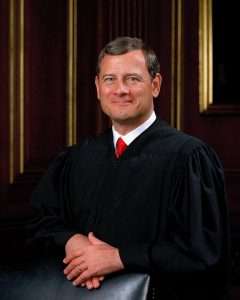The Volokh Conspiracy
Mostly law professors | Sometimes contrarian | Often libertarian | Always independent
Today in Supreme Court History: September 29, 2005
Editor's Note: We invite comments and request that they be civil and on-topic. We do not moderate or assume any responsibility for comments, which are owned by the readers who post them. Comments do not represent the views of Reason.com or Reason Foundation. We reserve the right to delete any comment for any reason at any time. Comments may only be edited within 5 minutes of posting. Report abuses.
Please to post comments



Smith v. Richey 89 s.ct. 54 (decided September 29, 1968): another soldier challenging callup to active duty as violating the Ready Reserve Act, for which Douglas notes there are "substantial and unresolved questions". Smith was going to be shipped out the next day "to the Asian theater" and Douglas "hesitates to act" but since the Ninth Circuit had denied a stay, Douglas grants it, keeping the soldier at Hamilton Air Force Base. (No information on what happened to this case, but the Ready Reserve Act, a/k/a the Military Selective Service Act, 50 U.S.C. §451 et seq., amended in 1967 to narrow the conscientious objector exception, has always passed Constitutional muster.)
Chamber of Commerce of U.S. v. Legal Aid Society of Alamada County, 423 U.S. 1309 (decided September 29, 1975): the last opinion by the stroke-felled Douglas, who embarrassed himself at oral argument of an application two weeks previously by being "out of it" but who apparently was on the ball for this one. Here he refuses to stay a protective order, noting that disclosure of demographic information on federal contractors collected by the EEOC is prohibited by statute and cannot be disclosed by another agency that ended up with the information.
Cooper v. Aaron, 358 U.S. 1 (decided September 29, 1958): full Court refuses to stay Little Rock desegregation order; Governor and state legislature are bound by decisions of District Court
A written order can be written or edited by a clerk.
That is probably true of most Justices, but especially so of Douglas after his stroke. Even before that, he was lazy, at least after about 1955. Though he might have had some “good days” those last few months and was lucid enough to dictate the essentials of his opinion.
Sounds like a description of our current President.
A black day in the history of the decline of American jurisprudence.
Coming soon to a SC near you, a new term under the Chief Equivocator.
So when will the leaker be revealed?
I've sworn many oaths since then.
That was actually funny
President George W. Bush initially nominated Roberts on July 29, 2005, to succeed the retiring Justice O'Connor, but when Chief Justice Rehnquist suddenly died on September 3, Bush withdrew the initial nomination, and re-nominated Roberts to succeed Rehnquist.
Justice Thomas recently made some comments that some interpreted as critical of Roberts' leadership, though Prof. Blackman disputed, correctly in my opinion, that interpretation. Prior to Rehnquist's death, the Court had not had a membership change in 11 years, an unusually long period historically, in fact, the second-longest period in Court history without a change in membership. Then, suddenly, there are two new members, including a new Chief. It would hardly be surprising for such a sudden change, after so long a period without it, would upset the Court's equilibrium.
The taint of Bush v. Gore delayed O’Connor’s retirement until after Bush was legitimately (re)elected in 2004.